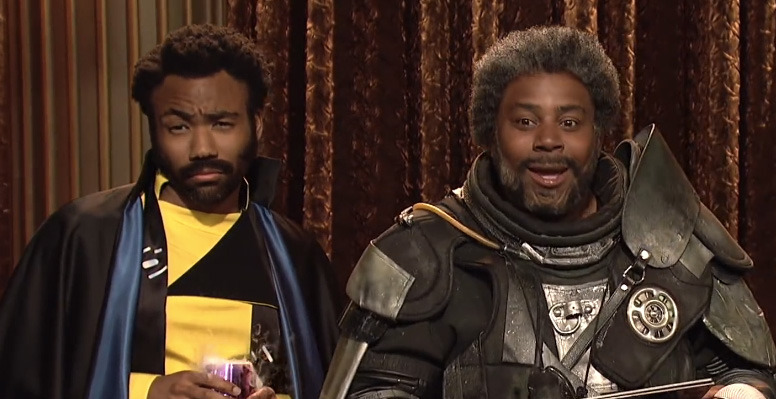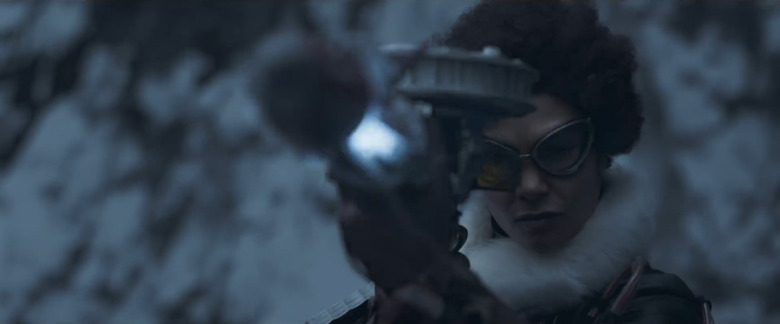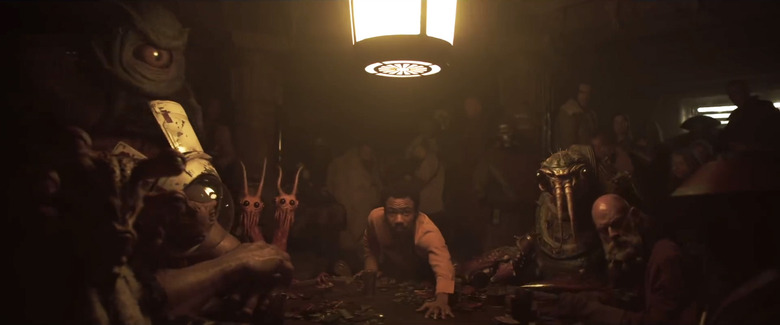Donald Glover's Lando Calrissian Proves It's Hard Out Here For A Space Pimp
In February, I analyzed Lando Calrissian's place in the '70s blaxploitation movement in a piece called "Pimpin' in Space: The Blaxploitation Roots of Lando Calrissian." I posited that Lando's characterizations, plus the popular film influences at the time of The Empire Strikes Back, puts Lando squarely within the stereotype of the black pimp, similar to characters like Sweet Sweetback and Super Fly. As I wrote back in that piece, one of Lando's ties to blaxploitation comes from the fact that "Lando further defines the mainstream image of blackness as being one synonymous with coolness and slickness. But with that image comes negative associations of blackness; being shifty, dangerous, and untrustworthy."
Naturally, with Lando making a grand return in Solo: A Star Wars Story, I felt it was time to revisit this topic and see how the new take on the character fares.
To borrow a quote from my own article:
"Looking at Lando from a blaxploitation perspective, the character continues the tradition of updating the trickster persona via the pimp. Even though Lando is in a galaxy in which racism doesn't exist, his costuming – his cape in particular – calls back to the movie pimps of the recent past, showing the audience he has a mystique the other (white) characters can't quite replicate or understand. His clothes exemplify his ability to work outside of the system that is still, despite it being in a galaxy far far away, set and run by white people."
His trickster ways are also lifted from blaxploitation pimps of the past, particularly the fact that even when he wins, he still ends up losing, such as when he successfully lures Han, Leia, and Luke to Darth Vader, but still ends up getting the short end of the bargain.
To quote myself again:
"...[H]is loss showcases how the street-justice style of the pimp is just another side of the dangerous black male stereotype, a stereotype that allows people to believe black people are inherently criminal and sexually violent. Such is the case for Sweet Sweetback. Despite the titular pimp becoming the hero of the film via killing a police officer who murdered a black militant and thus becoming, as Van Peebles described, radicalized, Sweet Sweetback still loses in the sense that it provides a so-called revolutionary look at black urban life within the same contexts defined by mainstream white media and thought."
In Solo: A Star Wars Story, we now have a younger, "new" Lando in the form of Donald Glover. It's a passing of the torch from Billy Dee Williams, the original Lando, to Glover, an actor who started out as a comedian, getting his break on Community, and has now graduated to rapping as his alter-ego Childish Gambino and creating, producing, and starring in his own show, Atlanta. Glover's path to playing Lando is different than Williams', and with Glover's experiences and newly socially-conscious outlook, it's easy to assume that Glover's Lando would be further away from the "space pimp" stereotype than Williams'.
But is he? Does 2018 Lando create a more well-rounded, less stereotypical take on the character, or is Lando still just "cool" without any substance?
Rooted in the past
It was easy for me to expect that Glover's Lando would be a much more modern take on the character. Glover himself has grown up over the years, seemingly ditching the token black guy air he carried on Community to become much more confident in terms of how he showcases race, politics, and social issues in his show Atlanta, which routinely elevates Hollywood's concept of a "black show" to something that examines the horror, majesty, and otherwise mundane elements of black life in artistic, unique ways. His newfound political side has also bled over into his music as Childish Gambino; his latest song "This Is America" asks its viewer to reckon with the amount of violence – particularly violence against black people – America commits on a daily basis, all the while utilizing black art and dance to distract itself from solving the real issues.
Seeing how much Glover has grown, I began to think that maybe today's Lando might have something to say about the world he's in and how it relates to our world. Glover's recent episode of Saturday Night Live seemed to prove me right; not only was Glover openly discussing the gulf between black and white audiences throughout the episode (such as when he not-so-coyly hinted that perhaps SNL didn't hire him because he was black), but he also featured in a skit as Lando, skewering the fact that Star Wars didn't even have enough black characters to fill a theoretical convention hall. In the skit, Lando is supposed to be hosting a conference for all of the black people in space, but only three people show up.
Sadly, this is not the Lando we got in Solo. Glover's performance as Lando on SNL isn't the same as the one we get in the movie. To be blunt, Glover's Lando in Solo is like seeing a Lando superfan pretend to be Lando at a convention or in a fan film. Glover plays him in a studied way, which is a little off-putting at times. Instead of adding something organic to the character, a lot of Glover's time as Lando is spent with him trying to recreate the swagger Billy Dee naturally possesses, which makes the character look one-note and, to be honest, a little silly at times.
This is my biggest irritation with Glover's portrayal. It isn't until the film is two-thirds complete with Lando's arc – the moment when his droid co-pilot (and love interest?) L3-37 gets killed by enemy fire during the mission to steal lucrative coaxium for Imperial gangster Dryden Vos (Paul Bettany) – that Glover finally breaks out of his imitations and injects Lando with rounder emotions. It would have been great if Glover was able to find himself in the role before this point in the film, since it would have only elevated the character.
As it stands, Glover keeps Lando within the "space pimp" mode throughout much of the movie. To be fair, Glover (and the filmmakers behind the camera) focus more on Lando's suave, debonair sensibilities, keeping him on the "Most Interesting Man in the World" side of the "space pimp" stereotype. Routinely, Glover's Lando is caught in the middle of recounting some of his most exciting adventures either to strangers in a Sabacc game or to himself, such as when he is seen recording his stories for posterity while waiting on Han, Beckett, and Qi'ra's mission to end.
But even if Lando is Most Interesting Man in the Galaxy, the needle hasn't moved on Lando's personality or characterization in over 30 years. When we meet Lando in Solo, he is already a gambler and con artist. The film has no interest in showing us how Lando came to be or why he's still interested in the criminal lifestyle. Instead, it doubles down on elements of Lando's blaxploitation-esque characterizations.
For instance, Lando openly flirts with Leia in Empire Strikes Back, cementing his status as a ladies' man in similar ways as male blaxploitation characters like Shaft are lauded for their sexual prowess. Throughout Solo, Lando is seen openly flirting with anyone and everyone who crosses his path, whether that's the alien serving him drinks or Han himself. Qi'ra tries to point out something "prodigious" about Lando before Han cuts her off, leaving it unknown as to whether she was referring to Lando's sexual escapades or his penis although it's clear she's referring to him in an erotic capacity. This keeps Lando rooted in blaxploitation stereotypes like black hypersexuality.
In Empire Strikes Back, Lando double crosses Han and Leia by selling them out to Darth Vader. In Solo, Lando double crosses Han during their first Sabacc game by using a cheat card. This keeps Lando rooted in the trickster category many Blaxploitation characters reside in. With the exception of L3's death, Lando is hardly ever written to deviate from the narrow confines of his characterization. He becomes less of a character and more of an artifact rooted in stereotype. There's got to be more to Lando than what meets the eye, and to see Lando's characterization largely unexplored is not only a shame, but it's also a missed opportunity.
To be fair, the entirety of Solo is an exercise in futility when it comes to deepening characterizations; it's not just Lando who suffers. Young Han is virtually the same, devil-may-care person as old Han, which, in a way, makes Han seem more vapid than the fandom would have you believe. There is no interest in examining what makes Han tick as a person or how he evolved to the swindler we meet in A New Hope; instead, there's more interest in having Han hit the same beats we've come to expect from him.
Pushing characters of color to the margins
When it comes to Lando, Solo's failures at characterization only magnifies the franchise's inability (or refusal) to investigate Lando and other characters of color on screen. Lando has been more fleshed out in the written canon than he has been in the film franchise; as we know, Lando only shows up twice in the original series, mostly to just act as Han's frenemy and to serve as The Black Guy in Star Wars.
Meanwhile, Lando's life has been much more deeply explored in the various books, comic books, and other media Lucasfilm has produced over the years. Yes, it's important to be aware of how much Lucasfilm invests in all of their characters when it comes to their tie-in media, but it would also be great if Lucasfilm actually felt like doing some of this examination in their films instead of either leaving characters of color out or giving them base level characterization. Hardcore fans who might have read the tie-ins might know the ins and outs of Lando, but as far as the film franchise go, it's a shame that what most movie fans know of the character is that he's the guy Han got the Millennium Falcon from.
Lando isn't the only character of color Solo refuses to analyze. The film has many secondary and tertiary marginalized characters, particularly those of the African diaspora, but the film routinely refuses to go beyond the surface level with them. Lando remains the cool, black archetype, with his coolness still being intrinsically linked to his blackness. Val (Thandie Newton), Beckett's girlfriend and right-hand, gets killed within the film's first 20 minutes. Enfys Nest (Erin Kellyman), someone Beckett and Han believe to be a pirate, is actually the leader of a resilient people (made up of people from the African diaspora) who fight against the Empire, and yet we never learn anything more about her or what their plans are for the coaxium. The tribe, by extension, are only used as a type of set dressing. There's a black woman entertainer on Dryden's yacht, but it's clear she's only there to serve as an exotic set piece.
These characters have intensely interesting stories that could have been explored in Solo, but instead, they are either killed to advance the men's storylines (as in the case of Val), pushed to the margins (as in the case of Enfys), used as objects (in the case of the singer and the tribe) to make room for exploring Han's story, which apparently doesn't have a lot to mine from, since Han never changes as a character.
If there's a playbook the filmmakers could have followed when it comes to investigating Lando as a black man in a complex space opera, they could have used the example Finn sets in the new Star Wars series. Finn could have easily been a stereotype (or had the potential to be more of a stereotype, since some feel Finn still plays into the "black coward" archetype). But instead, Finn is portrayed as a multifaceted young man who is confused about the direction of his life and wants personal peace at any cost, even if that means running away and appearing to others as a coward. Much of his attempts at running away are less about stereotypical cowardliness – it's more about his inability to see what he actually means to the galaxy. He slowly learns how anyone can be a hero, including himself, a person who grew up without ever learning his self-worth or potential. The new franchise is about him learning about himself and becoming more acquainted with his power as an individual. He's learning that even the smallest person can affect change.
That's character evolution. We see a character go through the roller coaster of dealing with success and failure, acquiring lessons along the way. At times we root for him, and at times we wish he'd lean away from his inner demons. But throughout the journey, we see the growth of a person. It's even better that this character growth is happening for a marginalized character, since marginalized characters, particularly characters of the African diaspora, are few and far between in the Star Wars universe.
Lando’s post-mortem
Overall, Lando is still a space pimp. Unfortunately, Solo and Glover's performance don't do much to elevate the character from his blaxploitation past. The film refuses to give one of the coolest people in the galaxy a backstory, and even worse, it seems like Lucasfilm is determined to never give us any more on-screen time with Lando. After being wrongly quoted as having greenlit a Lando film, Lucasfilm's Kathleen Kennedy has gone on record to say that a film about Lando is "not relevant" at this time.
Surely, things can change, since most of the fan reaction about Solo is about Lando, particularly how he's one of the better parts of the film. But if the chances of Lando's film are somehow linked to how well Solo does, then it seems like the chances of us ever seeing Lando could be small – Solo is struggling at the box office. Personally, I don't think Lucasfilm would be that cold as to root another Star Wars Story film's chances to the success of a prior work. But this is Hollywood, a place not known for highbrow attitudes towards race.
Despite the film being uninterested in updating Lando for today, the character is still being positioned as one that could serve as an extension of much needed representation in another area. The Kasdans recently went on record as saying Lando is pansexual, something that's actually more apparent in Solo than might be believed, seeing how sexually open Lando is (at least by Disney's puritanical standards). However, I'd argue that Lando's pansexuality is presented in a way that doesn't help; in fact, the film's presentation of it only perpetuates existing stereotypes.
As M. Arbeiter wrote for Nerdist, Lando and other characters in the pop culture zeitgeist like Deadpool and Rick from Rick and Morty wrongly showcase pansexuality as "frivolity, promiscuity, and total emancipation from inhibition, or even judgement. In other words, when these characters call themselves pansexual, what they're really saying is that they 'like to party.' And when they are allowed some showing of genuine heart, it comes with one caveat: keep it straight." Indeed, even when Lando is flirting with other non-human forms, they're usually female-presenting, including L3-37, who is voiced by Phoebe Waller-Bridge. Lando's flirtation with Han, while present, could be easily played off as a joke.
Even with an addition such as confirming his sexual identity, something that should make Lando updated for modern times, he still comes off as ill-defined as when we last saw him in Return of the Jedi and perhaps, because his sexual identity has been portrayed in a ham-fisted way, Lando might feel even more archaic than ever before. That's a shame. The song from Hustle and Flow is right – it's hard out here for a pimp.



